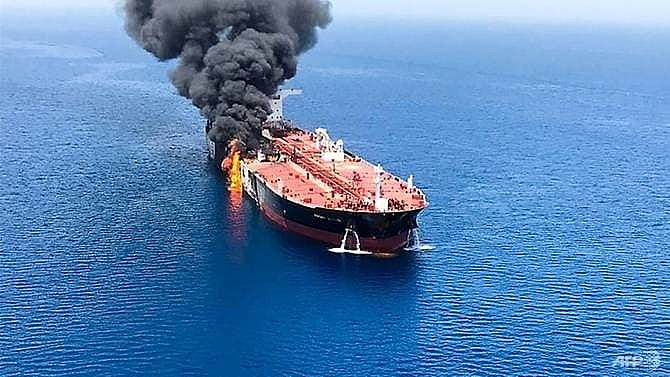US warns UN of 'clear threat' from Iran after tanker attacks
 |
| A picture obtained by AFP from Iranian News Agency ISNA shows fire and smoke billowing from Norwegian-owned Front Altair tanker said to have been attacked in the waters of the Gulf of Oman. (Photo: AFP) |
The council met behind closed doors to hear US acting Ambassador Jonathan Cohen present a briefing on Washington's assessment that Iran was responsible for the suspected attack on two tankers in the strategic sea lane.
The attacks, which came a month after a similar incident targeting four tankers off the coast of the United Arab Emirates, "demonstrate the clear threat that Iran poses to international peace and security," Cohen said.
"I've asked the Security Council to remain seized of the matter and I expect that we will have further conversations about it and how to respond in the days ahead," he added.
Washington's view was not shared by other council members, who noted that there was no clear evidence to link Iran to the attacks, diplomats said.
Kuwait's Ambassador Mansour al-Otaibi said council members condemned the violence and that many of them called for an investigation to determine the facts.
"We would like to know who was behind this incident," he told reporters after the meeting.
The latest incident came amid spiralling tensions between Tehran and Washington, which has pointed the finger at Iran over earlier tanker attacks in May.
UN Secretary-General Antonio Guterres said the facts should be established but warned against stoking conflict in the volatile Gulf.
"If there is something the world cannot afford, it is a major confrontation in the Gulf region," he told an earlier council meeting on UN cooperation with the Arab League.
STATE ACTOR
The Norwegian Maritime Authority said three explosions were reported on Thursday on board the Norwegian-owned tanker Front Altair after it was "attacked," along with the Singapore-owned ship Kokuka Courageous.
Iran said its navy had rescued 44 crew members after the two vessels, which were carrying highly flammable material, caught fire.
On May 12, four oil tankers - two Saudi, one Norwegian and one Emirati - were damaged in still unexplained attacks in the Gulf of Oman off the United Arab Emirates.
The UAE last week said initial findings of its investigation pointed to the likelihood that a "state actor" was behind the bombings, but did not specifically blame Iran.
The preliminary findings were presented to the council which may consider a response.
These showed that it was "highly likely" that four Limpet mines, which are magnetically attached to a ship's hull, were used in the attacks, placed by trained divers deployed from fast boats.
What the stars mean:
★ Poor ★ ★ Promising ★★★ Good ★★★★ Very good ★★★★★ Exceptional
Related Contents
Latest News
More News
- Russian President congratulates Vietnamese Party leader during phone talks (January 25, 2026 | 09:58)
- Worldwide congratulations underscore confidence in Vietnam’s 14th Party Congress (January 23, 2026 | 09:02)
- Political parties, organisations, int’l friends send congratulations to 14th National Party Congress (January 22, 2026 | 09:33)
- 14th National Party Congress: Japanese media highlight Vietnam’s growth targets (January 21, 2026 | 09:46)
- 14th National Party Congress: Driving force for Vietnam to continue renewal, innovation, breakthroughs (January 21, 2026 | 09:42)
- Vietnam remains spiritual support for progressive forces: Colombian party leader (January 21, 2026 | 08:00)
- Int'l media provides large coverage of 14th National Party Congress's first working day (January 20, 2026 | 09:09)
- Vietnamese firms win top honours at ASEAN Digital Awards (January 16, 2026 | 16:45)
- ASEAN Digital Ministers' Meeting opens in Hanoi (January 15, 2026 | 15:33)
- ASEAN economies move up the global chip value chain (December 09, 2025 | 13:32)

 Tag:
Tag:




















 Mobile Version
Mobile Version